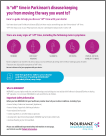Get connected through our
support program and get updates
about NOURIANZ®
To receive information and resources about Parkinson’s
disease (PD) and NOURIANZ® (istradefylline), simply fill out
the form and select your answers below.
You can get resources
delivered directly to your
inbox including:
Check this box to acknowledge that by clicking “SUBMIT” and providing your name, email address, or other personal information, you agree that Kyowa Kirin and others working on behalf of Kyowa Kirin may contact you in the future about NOURIANZ, educational programs, health-related topics, and advancements in the treatment of Parkinson’s disease. Kyowa Kirin respects the privacy of visitors to its websites, and we recognize your need for protection and management of personally identifiable information you share with us (any information by which you can be identified, including but not limited to name, address, and telephone number). Click here to read the Kyowa Kirin Privacy Policy and Terms of Use. Please check the box to indicate your agreement
What is NOURIANZ?
NOURIANZ is a prescription medicine used with levodopa and carbidopa to treat adults with Parkinson’s disease (PD) who are having “off” episodes. It is not known if NOURIANZ is safe and effective in children.
Important Safety Information
Before you take NOURIANZ, tell your healthcare provider about all your medical conditions, including if you:
- have a history of abnormal movement (dyskinesia)
- have reduced liver function
- smoke cigarettes
- are pregnant or plan to become pregnant. NOURIANZ may harm your unborn baby
- are breastfeeding or plan to breastfeed. It is not known if NOURIANZ passes into breast milk. You and your healthcare provider should decide if you will take NOURIANZ or breastfeed
Tell your healthcare provider about all the medicines you take, including prescription and over-the-counter medicines, vitamins, and herbal supplements.
NOURIANZ and other medicines may affect each other causing side effects. NOURIANZ may affect the way other medicines work, and other medicines may affect how NOURIANZ works.
What are the possible side effects of NOURIANZ?
NOURIANZ may cause serious side effects, including:
- uncontrolled sudden movements (dyskinesia). Uncontrolled sudden movements is one of the most common side effects.
- hallucinations and other symptoms of psychosis. NOURIANZ can cause abnormal thinking and behavior, including:
- being overly suspicious or feeling people want to harm you (paranoid ideation)
- believing things that are not real (delusions)
- seeing or hearing things that are not real (hallucinations)
- confusion
- increased activity or talking (mania)
- disorientation
- aggressive behavior
- agitation
- delirium (decreased awareness of things around you)
- unusual urges (impulse control or compulsive behaviors). Some people taking NOURIANZ get urges to behave in a way unusual for them. Examples of this are unusual urges to gamble, increased sexual urges, strong urges to spend money, binge eating, and the inability to control these urges.
If you notice or your family notices that you are developing any new or unusual symptoms or behaviors, talk to your healthcare provider.
The most common side effects of NOURIANZ include uncontrolled movements (dyskinesia), dizziness, constipation, nausea, hallucinations, and problems sleeping (insomnia).
These are not all the possible side effects of NOURIANZ.
Call your doctor for medical advice about side effects. You may report side effects to FDA at 1-800-FDA-1088 or www.fda.gov/medwatch.
Please see Patient Information for NOURIANZ.



